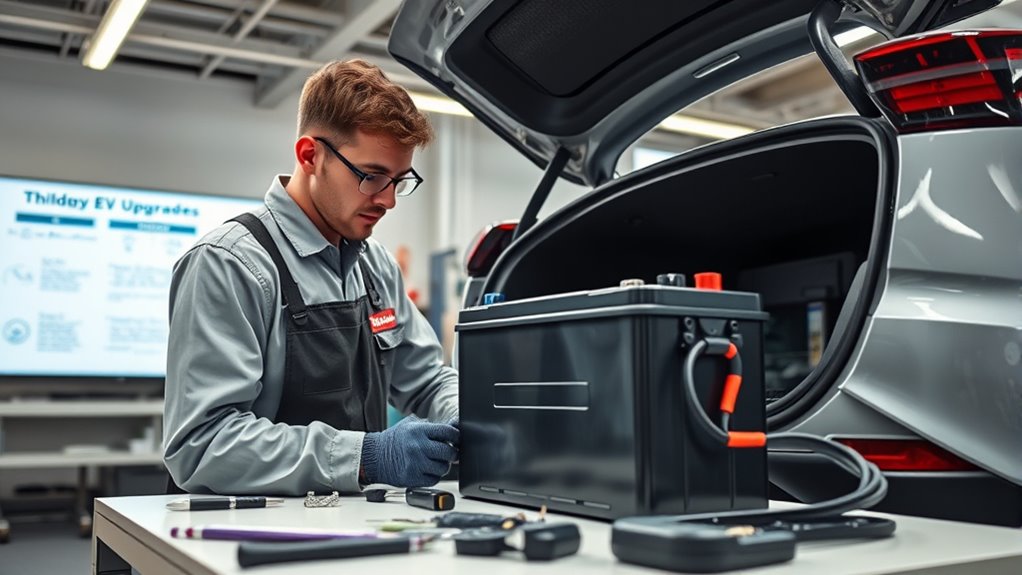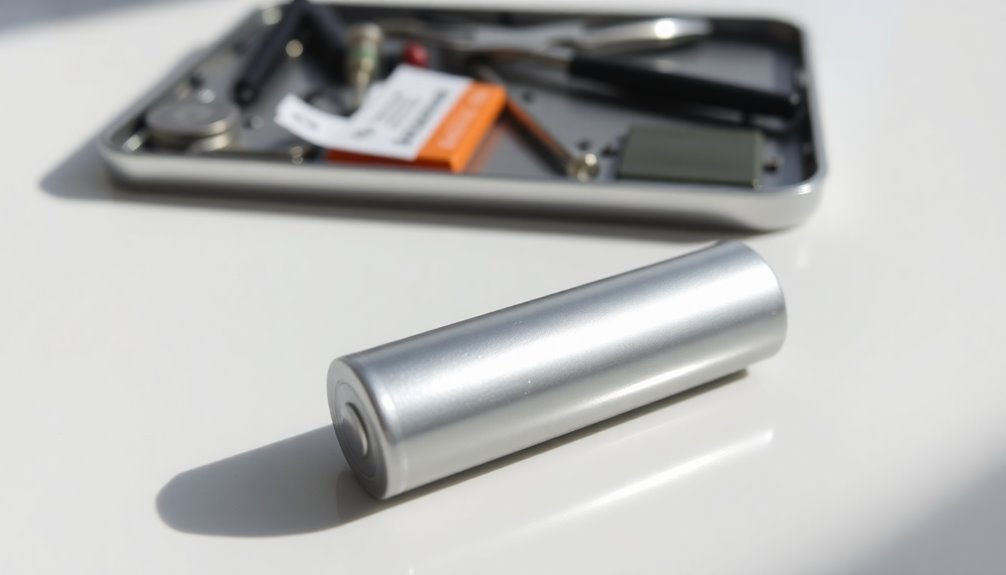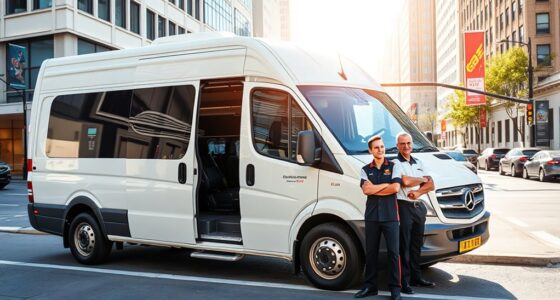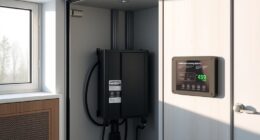When considering third-party EV battery upgrades, it’s essential to understand potential warranty impacts, safety procedures, and compatibility issues. Installing non-OEM batteries may void your vehicle’s warranty, and improper installation can cause safety risks or damage. Always choose qualified technicians who follow strict safety standards and verify the compatibility of the new battery. Some providers offer their own warranties, but these may differ from the original. Keep exploring to learn how to navigate these factors confidently.
Key Takeaways
- Verify third-party batteries are compatible with your EV model to prevent performance issues and damage.
- Professional installation by certified technicians ensures safety, proper functioning, and compliance with standards.
- Third-party upgrades may void manufacturer warranties; check warranty policies and potential implications beforehand.
- Use reputable providers that offer warranties and quality assurance to reduce risks and ensure long-term reliability.
- Consider legal aspects like warranty voidance and compliance with local regulations before installing non-OEM batteries.
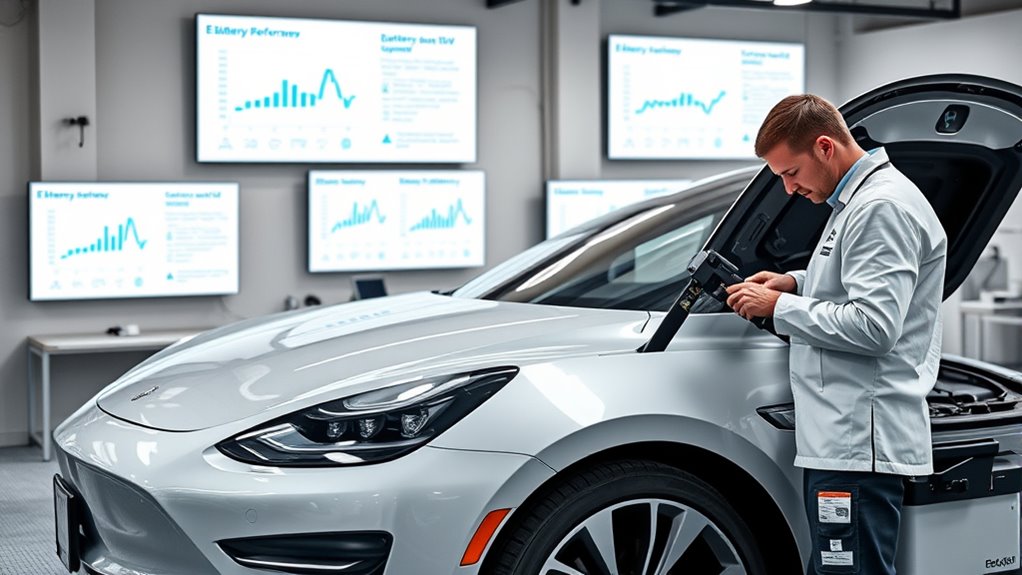
As electric vehicles become more popular, many owners are exploring third-party battery upgrades to extend their car’s range and improve performance. These upgrades can be tempting because they might offer more capacity or faster charging capabilities beyond what the original manufacturer provides. However, before diving into a third-party solution, you need to consider several important factors, especially regarding your vehicle’s battery warranty and installation safety.
One of the main concerns with third-party EV batteries is how they impact your vehicle’s warranty. Most automakers include a battery warranty that protects against defects and performance issues for a set period or mileage. Installing a non-OEM (original equipment manufacturer) battery could void this warranty, leaving you responsible for future repairs or replacements. Manufacturers often scrutinize third-party upgrades, and they may refuse warranty claims if they determine the aftermarket battery caused damage or failed prematurely. To avoid this, you should research whether the upgrade provider offers any warranty or guarantee on their product and installation. Some reputable third-party companies now provide their own warranties to give you peace of mind, but these are not always equivalent to your vehicle’s original coverage.
Third-party EV batteries may void your warranty and lead to costly repairs.
Another critical aspect is installation safety. Proper installation isn’t just about plugging in a new battery; it involves complex procedures that must follow strict safety protocols. An improperly installed battery can lead to serious issues like electrical fires, leaks, or damage to your vehicle’s electrical system. When considering a third-party upgrade, ensure you choose a service provider with certified technicians experienced in EV battery installations. They should follow safety standards, use quality components, and conduct thorough testing before returning your vehicle to you. Avoid DIY approaches or unqualified installers, as mistakes during installation can compromise your safety and the integrity of your vehicle.
Furthermore, you should verify that the third-party battery is compatible with your specific EV model. Mismatched batteries can cause performance problems, reduce range, or even damage your vehicle’s electronics. Ask for detailed specifications and ensure the supplier provides clear documentation about compatibility and safety testing. Glycolic acid products are often used in skincare routines to improve skin texture and radiance, highlighting the importance of proper product selection and safety considerations in skincare, similar to choosing the right third-party components for your vehicle.
Frequently Asked Questions
Are Third-Party Battery Upgrades Covered by Vehicle Warranties?
Third-party battery upgrades usually aren’t covered by your manufacturer warranties. If something goes wrong, the manufacturer may deny coverage due to unauthorized modifications. Additionally, installing a third-party upgrade can create legal liabilities if it causes damage or safety issues. You should check your warranty terms and consider potential legal implications before opting for a third-party upgrade, as it might void your warranty or lead to costly repairs.
How Do Third-Party Upgrades Affect Resale Value?
Third-party upgrades can impact your resale value, often negatively. Buyers may view the market perception of non-original parts as a sign of potential issues or reduced reliability, which can make your vehicle less attractive. While some may see it as an upgrade, others might worry about warranty coverage or compatibility problems. To preserve resale value, consider sticking with manufacturer-approved upgrades or maintaining thorough service records.
What Safety Standards Do Third-Party Batteries Meet?
Third-party batteries must meet strict safety standards through battery certification and safety compliance. You should verify that the upgraded battery has proper certification from recognized authorities, ensuring it adheres to safety protocols. This guarantees the battery’s reliability and reduces risks like overheating or fires. Always ask providers for documentation proving their batteries meet industry safety compliance, so you can drive confidently knowing your vehicle remains safe and compliant with regulations.
Can I Upgrade My EV Battery Myself or Require Professional Help?
They say, “A chain is only as strong as its weakest link,” so you shouldn’t DIY install your EV battery. Upgrading your battery requires expert knowledge to guarantee proper battery compatibility and safety. While some experienced tech enthusiasts might attempt DIY installation, most should seek professional help to avoid damaging your vehicle or risking safety. Trust the pros to handle your EV upgrade for a secure, reliable, and legal upgrade.
Are There Insurance Implications With Third-Party Battery Modifications?
Yes, third-party battery modifications can impact your insurance liability and policy coverage. If you upgrade your EV battery with non-OEM parts, your insurer might view it as a risk, potentially voiding or limiting coverage. Always check with your insurance provider before making such changes. Understanding your policy guarantees you’re aware of any implications, helping you avoid surprises if an accident or claim occurs after a modification.
Conclusion
While some worry about legal risks or warranty issues, upgrading your EV battery through a reputable third-party service can boost your vehicle’s performance without sacrificing reliability. Think of it as giving your car a fresh lease on life—more range, better power—without the hefty price of a new vehicle. With proper research and trusted providers, you can enjoy these upgrades confidently, knowing you’re making a smart, eco-friendly choice that keeps your car running smoothly for years to come.

